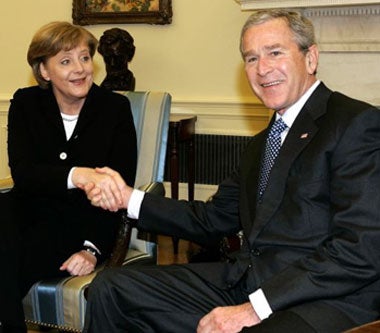Berlin admits giving US bombing targets in Iraq

Your support helps us to tell the story
From reproductive rights to climate change to Big Tech, The Independent is on the ground when the story is developing. Whether it's investigating the financials of Elon Musk's pro-Trump PAC or producing our latest documentary, 'The A Word', which shines a light on the American women fighting for reproductive rights, we know how important it is to parse out the facts from the messaging.
At such a critical moment in US history, we need reporters on the ground. Your donation allows us to keep sending journalists to speak to both sides of the story.
The Independent is trusted by Americans across the entire political spectrum. And unlike many other quality news outlets, we choose not to lock Americans out of our reporting and analysis with paywalls. We believe quality journalism should be available to everyone, paid for by those who can afford it.
Your support makes all the difference.Chancellor Angela Merkel's fence-mending visit to the United States is being overshadowed by a growing scandal over reports that German intelligence had fed America key information about military targets in Iraq before the US invasion.
German MPs have called for a full inquiry into the allegations amid speculation about the future of Franz Walter Steinmeyer, Mrs Merkel's Social Democrat Foreign Minister, who was a senior government official during the Iraq war.
The reports of German-US intelligence co-operation, aired on Germany's ARD television channel, were confirmed by Berlin government sources and appeared to run directly counter to official German government policy on the war.
Citing a US government official, the TV channel said German intelligence officers in Baghdad had supplied information about a restaurant in the Mansur district of the city which the Iraqi leader, Saddam Hussein, was said to have frequented on the eve of the US-led invasion. The US military bombed the building killing 12 people.
Renate Kunast, the opposition Greens party parliamentary leader described the reports as "monstrous". She added: "This suggests Germany took part in the war against Iraq after all."
Government officials conceded that Germany's BND intelligence services maintained a presence in Baghdad. But they declined to say what kind of information had been passed to the Americans other than details about which buildings - such as schools, hospitals and embassies- should not be bombed.
Mrs Merkel's two day trip to Washington had been widely canvassed as an attempt to repair the most serious rift in German-US relations since 1945, caused by the vehement opposition by her predecessor, Gerhard Schröder, to the invasion.
In Germany, there is speculation that the reports of German-US intelligence co-operation had been deliberately timed to embarrass Mrs Merkel during her visit and dampen her attempt to improve relations with Washington.
But in a speech at Washington's German embassy shortly after her arrival, Germany's first woman Chancellor suggested she was determined not to disappoint her American hosts, "We must now muster enough strength to begin a new phase in our relationship," she said.
And in a clear acknowledgement of the White House stance on terrorism she added: "The fight against terrorism has proven more difficult than the Cold War."
Washington underscored the importance of Mrs Merkel's visit by allotting three hours for her meeting with President George Bush and the Secretary of State, Condoleezza Rice. In Germany, the US ambassador to Berlin has been on in a charm offensive, saying in interviews that German-US ties are "excellent." Before Mrs Merkel's visit, the Bush administration said they viewed Germany's new conservative leader as a strong partner who could help bridge differences.
Yet despite the pro-US rhetoric, German officials have made clear they have no misgivings about the abilities of Mrs Merkel's grand coalition government to substantially change Germany's position on key issues of American interest.
Although Mrs Merkel has shifted from her predecessor by stressing the importance of a US-led Nato, she ruled out sending German troops to Iraq. Shortly before her visit, she criticised the US prison in Cuba, saying: "Guantanamo cannot and should not exist in the long term. Ways must be found to handle prisoners differently."
Surveys show that among the 72 per cent of Europeans opposed to US foreign policy, Germany tops the bill, with 83 per cent of the people at odds with President Bush.
Join our commenting forum
Join thought-provoking conversations, follow other Independent readers and see their replies
Comments